The post Recap: DBpedia Day in Amsterdam @ SEMANTiCS 2024 appeared first on DBpedia Association.
]]>First and foremost, we would like to thank the Institute for Applied Informatics for supporting our community and many thanks to the SEMANTiCS organization team for hosting this year’s DBpedia Day.
Opening of the DBpedia Day
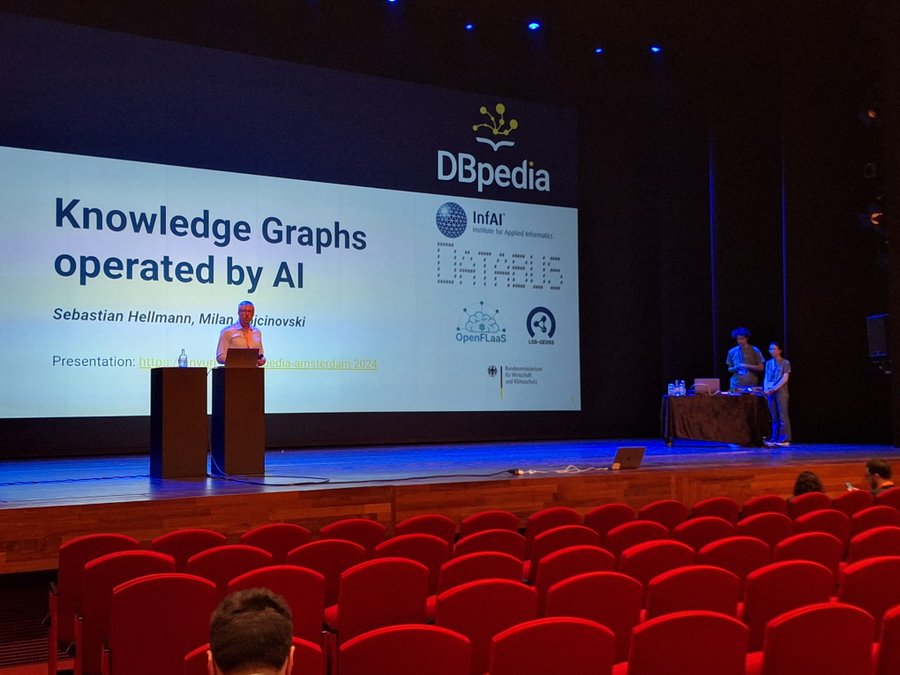
Our CEO Sebastian Hellmann opened this year’s community meeting by giving the presentation “KG Operated by AI” (slides). Afterwards, Ruben Verborgh from the Ghent University – imec gave his fantastic keynote presentation “Trust me, I’m a Human”. You can read his abstract here. In his presentation, Ruben Verborgh explored the timeless nature of numbers and data, humorously linking their existence to key events in history, from the Big Bang to the development of the Web and GDPR. He concluded by highlighting the arrival of ChatGPT in 2022, playfully claiming it made all previous innovations obsolete.
Session: AI Applications on top of KGs
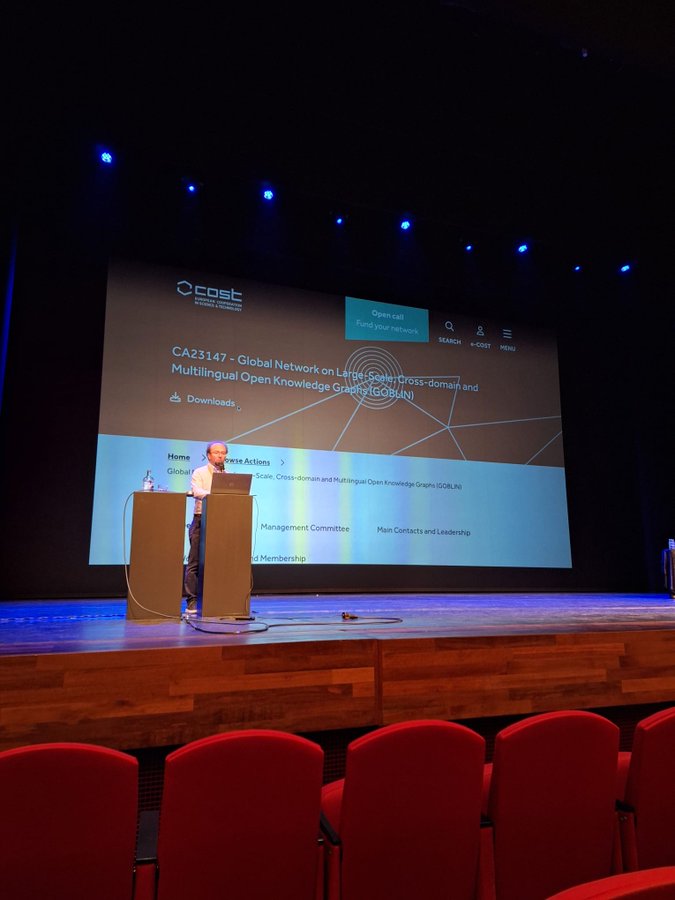
Milan Dojchinovski, InfAI/DBpedia Association and CTU Prague, started the second session “AI Applications on top of KGs” with a short welcome. The first speaker was Ricardo Alonso Maturana, GNOSS, with his presentation “Truth and reality in the early deployment of the AI Society (slides). About explainable AI and the role of Large, Global, Unified Knowledge Graphs.”. Shortly after, Purushotham Botla, Infinite Analytics, talked about “Leveraging LLMs on top of Knowledge Graphs and to Understand Place, People, and Product Relationships” (slides). Next, Kilian Pramschiefer, starki.berlin, talked about “AI for all – A bottom-up, symbolic approach to artificial reasoning” (slides). Finally, the last presentation “ORKG Ask: A Neuro-Symbolic Scholarly Search System” was given by Allard Oelen, TIB – Leibniz Information Centre for Science and Technology (slides).
Session: Design, Construction and Refinement of KGs by AI
This session focused on how AI can support Knowledge Graphs. New research on linking and consumption of the DBpedia Knowledge Graph and LLM were presented, as well as methods and tools. Milan Dojchinovski, InfAI/DBpedia Association and CTU Prague, chaired this session with three talks. Hereafter you will find the presentations given during this session:
- “Training an LLM for generating KG from raw transcript” by Michiel Buisman, CIO Office at UWV (slides)
- “Text2Networks: Bootstrapping Domain Ontologies and Inference Pipelines that Build Graphs from Textual Data Streams” by Chris Hokamp & Demian Gholipour Ghalandari, Shashank Mangla & Jack Boylan, Quantexa
- “LLM-assisted KG engineering” by Johannes Frey, InfAI (slides)
Discussion Session: DBpedia and AI
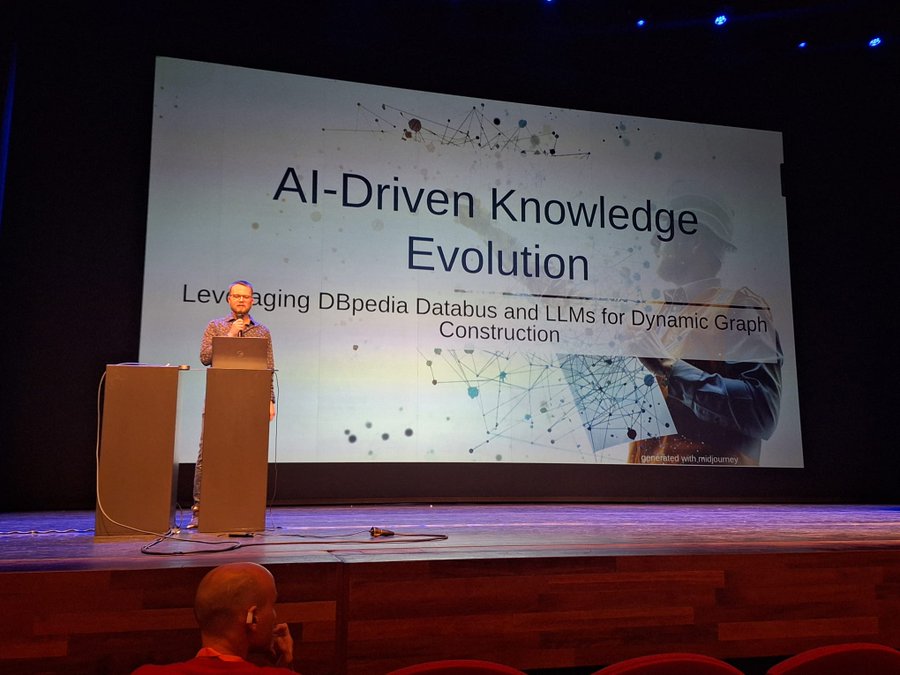
The session “Discussion Session on DBpedia and AI”, chaired by Sebastian Hellmann, InfAI/DBpedia Association, focused on the integration of large language models (LLMs) and knowledge graphs. Marvin Hofer, ScaDS.AI, presented his talk on “AI-Driven Knowledge Evolution: Leveraging DBpedia Databus and LLMs for Dynamic Graph Construction”, where he explored how AI can be used to enhance and automate the creation of knowledge graphs (slides). The session also included an interactive part, moderated by Sebastian Hellmann, encouraging audience participation and discussion (slides).
In case you missed the event, all slides are also available on our event page. Further insights, feedback and photos about the event are available on Twitter via #DBpediaDay.
We are now looking forward to more DBpedia events in the upcoming months and next year’s SEMANTiCS Conference, which will be held in Vienna, Austria..
Stay safe and check Twitter or LinkedIn. Furthermore, you can subscribe to our Newsletter for the latest news and information around DBpedia.
Maria & Julia
On behalf of the DBpedia Association
The post Recap: DBpedia Day in Amsterdam @ SEMANTiCS 2024 appeared first on DBpedia Association.
]]>The post CfP: KG operated by AI – DBpedia Day 2024 appeared first on DBpedia Association.
]]>Event Date: 17th September 2024
Location: Co-located with SEMANTiCS 2024
Event Website: https://www.dbpedia.org/events/dbpedia-day-2024/
We invite the world’s leading Knowledge Engineering experts to gain insights on the topic “Knowledge Graphs operated by AI”. This event aims to explore how recent advances in AI can leverage and exploit structured knowledge, as well as address new challenges and necessary changes to advance the vision of “Knowledge Graphs operated by AI”.
DBpedia, as one of the first open knowledge graphs since 2007, has significantly influenced and shaped existing standards. As a community, we should now work together to reap the benefits of the available structured knowledge. New opportunities are developing via recent advances in AI, and we seek input on leveraging this technology, as well as an open discussion on the challenges and necessary changes to further the vision of AI-operated Knowledge Graphs.
Topics include (but are not limited to):
- Standards and Best Practices:
- Streamlining consumption by AI: Proposing changes and frameworks to improve the current Linked Data and Knowledge Graph infrastructure.
- Discovery, summarization, and efficient data retrieval methods.
- REST/HATEAOS, Structured Data Islands/JSON-LD, 303-less Linked Data.
- Metadata standards for better linking, integration, and interoperability.
- Development and enhancement of Ontologies and Mappings to facilitate the integration of knowledge from distributed sources.
- Exploration and Querying:
- Building novel AI-driven interfaces using natural language processing.
- Automatically generating SPARQL queries from natural language inputs.
- Integrating secure knowledge in Generative AI systems.
- Acquiring Knowledge:
- Methods for AI to autonomously discover and integrate new data sources.
- Leveraging machine learning techniques for the automated extraction of knowledge from unstructured data.
- Enhancing knowledge bases with real-time data updates and corrections.
- Coordinating Knowledge:
- Frameworks and protocols for the coordination of knowledge across distributed systems.
- AI-driven methods for ensuring data consistency and integrity.
- Utilizing blockchain and other technologies for secure and transparent knowledge coordination.
- Managing Knowledge:
- Strategies for maintaining and updating knowledge graphs using AI.
- AI-driven validation and verification of knowledge to ensure accuracy and relevance.
- Techniques for scalable storage and retrieval of vast amounts of structured data.
- Ethical and Societal Implications:
- Addressing privacy and security concerns in AI-operated knowledge graphs.
- Ensuring transparency and explainability in AI’s use of knowledge graphs.
- Understanding the societal impact of AI-driven knowledge management and dissemination.
- Use Cases and Applications:
- Real-world examples of AI leveraging knowledge graphs for various applications.
- Case studies on the success and challenges of implementing AI-driven knowledge management systems.
- Innovative applications in healthcare, finance, education, and other sectors.
We look forward to your contributions and discussions on how we can collaboratively advance the integration of AI and Knowledge Graphs, bringing us closer to realizing the Semantic Web’s original vision.
Submission Guidelines
Please submit your presentation proposals by Monday July 1st, 2024 (Anywhere On Earth; UTC-12) to https://forms.gle/hQydymKtzaHSysJx6. Proposals should include a title, abstract (300 words max), and a brief biography of the presenter(s).
Abstracts will be evaluated based on establishing a strong relation to the call and its topics. While we generally welcome mature and well-engineered showcases and implementations, we will accept some talks with idea, position or impulse character. Additionally, we will positively evaluate industry talks that describe needs and requirements.
For further details, visit our website https://www.dbpedia.org/events/dbpedia-day-2024/.
If you have any questions, please contact dbpedia@infai.org.
Join us at DBpedia Day 2024 and be a part of shaping the future of Knowledge Graphs operated by AI!
The post CfP: KG operated by AI – DBpedia Day 2024 appeared first on DBpedia Association.
]]>The post Recap: DBpedia Training @ Data Week Leipzig appeared first on DBpedia Association.
]]>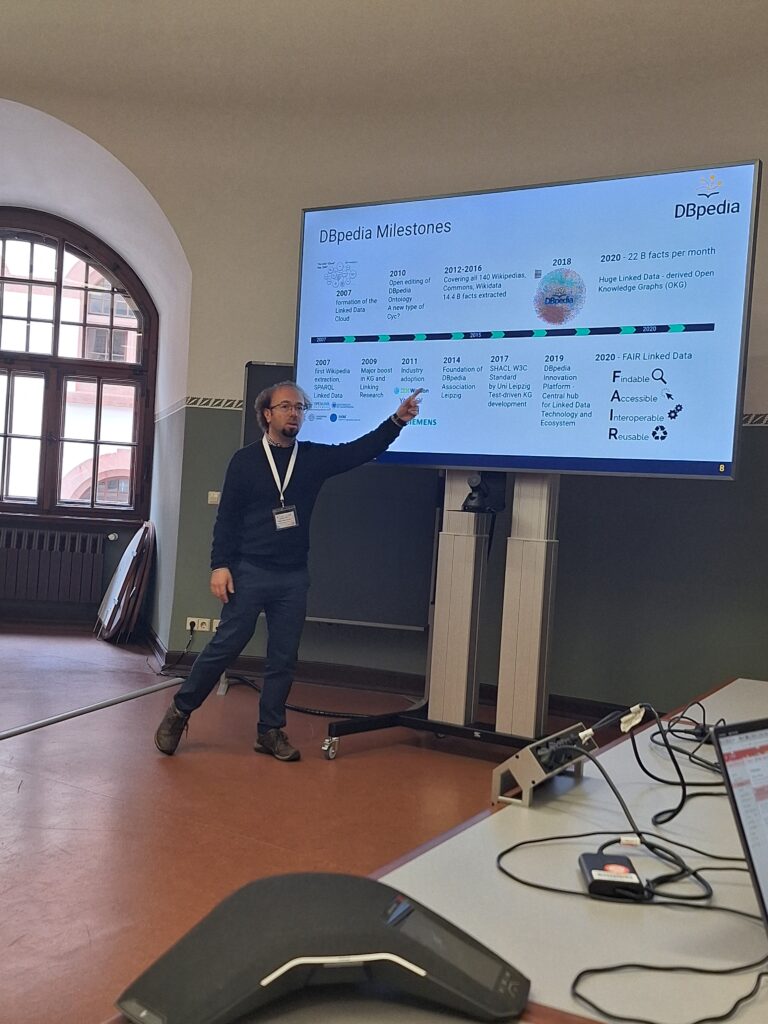
On 16 April, as part of Data Week Leipzig, the DBpedia training on the topic of “Harnessing the Power of DBpedia: Transforming Data into Knowledge” took place with three sessions and different presentations in each. This workshop was designed to introduce you to the vast capabilities of DBpedia and its suite of technologies that are reshaping the way we interact with the world’s knowledge. This tutorial gave all participants an insight into the comprehensive DBpedia technology ecosystem. It was also an opportunity to learn how to integrate and leverage these components to create innovative solutions.
Opening of the DBpedia Training
Milan Dojchinovski (InfAI, DBpedia Association, CTU Prague) and Sebastian Hellmann (InfAI, DBpedia Association) started the opening of the DBpedia Training with general information on the tutorial. Topics of this training were DBpedia in the nutshell, the DBpedia Databus, Databus Use Cases and Deploying your own DBpedia. We also presented four showcases: Semantic Indexing and Search using DBpedia tech, CI and Databus publishing using Jenkins, Databus Metadata Overlay Search System and Terminology Server using Databus, Lookup and Archivo.
Session 1: DBpedia Tech Overview and DBpedia Databus
In the first session, Milan Dojchinovski gave an overview of DBpedia and Sebastian Hellmann gave an introduction to Databus Use Cases, followed by the presentations on “Databus and Collections” and “Making your own DBpedia KG” by Jan Forberg.
Session 2: DBpedia and Databus Showcases: Semantic Indexing and CI
The second session started with “Semantic Indexing and Search using DBpedia Spotlight and Databus” by Jan Forberg which was followed by Kirill Yankov with “CI and Databus publishing using Jenkins”.
Session 3: DBpedia and Databus Showcases (cont.): Metadata Overlay Search and Terminology Server
In the last session, Jan Forberg and Jonathan Justavino Lüderitz talked about “Databus Metadata Overlay Search System (MOSS)”. The final presentation was given by Johannes Frey on “Terminology Server using Databus, Lookup and Archivo”.
Closing Session
Finally, in the closing session, chaired by Milan Dojchinovski (InfAI, DBpedia Association, CTU Prague) there was time for a little wrap-up, questions and feedback on the DBpedia Training.
The slides from the DBpedia Training are available here.
We are looking forward to more DBpedia events in the next months. Stay safe and check Twitter or LinkedIn. Furthermore, you can subscribe to our Newsletter for the latest news and information around DBpedia.
Maria & Julia
on behalf of the DBpedia Association
The post Recap: DBpedia Training @ Data Week Leipzig appeared first on DBpedia Association.
]]>The post DBpedia – GSoC Bonding Period 2024 appeared first on DBpedia Association.
]]>Contributor Projects Announced
This week Google finally announced who is selected as a GSoC contributor for this year. Accepted contributors are therefore now paired with mentors and start planning their projects and milestones.
GSoC Community Bonding
As the Community Bonding is starting now from May, 1 until May, 26 it is now the time to spend a month learning more about DBpedia and it’s community before coding starts on May, 27. Check the timeline on our page! To get in touch with your mentores and everyone else from the DBpedia Community, you have plenty of options:
- First of all, you can chat with other DBpedians on Slack, where you are able to join DBpedia developers discussion and technical discussions.
- To increase your visibility in the DBpedia Community, try to answer some questions in the DBpedia forum (especially in the unanswered & support category) and browse the topics.
- Last but not least, check out our Github repository for open issues and see if you can help to solve them (e.g issues regarding the extraction framework or mappings).
When you share something about your project on your own blog or github, please inform us and your mentors. Thus, we can share it with the community and show your working progress as well as your results.
In case you still have questions, please do not hesitate to contact us via dbpedia@infai.org.
Check Twitter or LinkedIn and feel free to subscribe to our newsletter for the latest news and information around DBpedia.
We wish you all the best!
Julia
on behalf of the DBpedia Association
The post DBpedia – GSoC Bonding Period 2024 appeared first on DBpedia Association.
]]>The post GSoC 2024 – Call for Contributors appeared first on DBpedia Association.
]]>We have been accepted to be part of this incredible program to support young ambitious developers who want to work with open-source organizations like DBpedia. So far, each year has brought us new project ideas, many amazing students and great project results that shaped the future of DBpedia. Even though Covid-19 changed a lot in the world, it couldn’t shake Google Summer of Code (GSoC) much. The program, designed to mentor youngsters from afar is almost too perfect for us. One of the advantages of GSoC is, especially in times like these, the chance to work on projects remotely, but still obtain a first deep dive into Open Source projects like us.
DBpedia is now looking for contributors who want to work with us during the upcoming summer months.
What is Google Summer of Code?
Google Summer of Code is a global program focused on bringing developers into open source software development. Funds will be given to all new beginner contributors to open source over 18 years to work for two and a half months (or longer) on a specific task. For GSoC-Newbies, this short video and the information provided on their website will explain all there is to know about GSoC2024.
And this is how it works …
| Step 1 | Check out one of our projects here or draft your own. |
| Step 2 | Get in touch with our mentors as soon as possible and write up a project proposal of at least 8 pages. Information about our proposal structure and a template are available here. |
| Step 3 | After a selection phase, contributors are matched with a specific project and mentor(s) and start working on the project. |
Application Procedure GSoC2024
Further information on the application procedure is available in our DBpedia Guidelines. There you will find information on how to contact us and how to appropriately apply for GSoC2024. Please also note the official GSoC 2024 timeline for your proposal submission and make sure to submit on time. Unfortunately, extensions cannot be granted. Final submission deadline is April 2, 2024 at 18:00 UTC.
Contact
Detailed information on how to apply are available on the DBpedia website. We’ve prepared an information kit for you. Please find all necessary information regarding the student application procedure here.
And in case you still have questions, please do not hesitate to contact us via dbpedia@infai.org.
Stay safe and check Twitter or LinkedIn. Furthermore, you can subscribe to our Newsletter for the latest news and information around DBpedia.
Finally, we are looking forward to your contribution!
Yours DBpedia Association
The post GSoC 2024 – Call for Contributors appeared first on DBpedia Association.
]]>The post A year with DBpedia – Retrospective Part 2/2023 appeared first on DBpedia Association.
]]>Tutorial @ Language, Data and Knowledge conference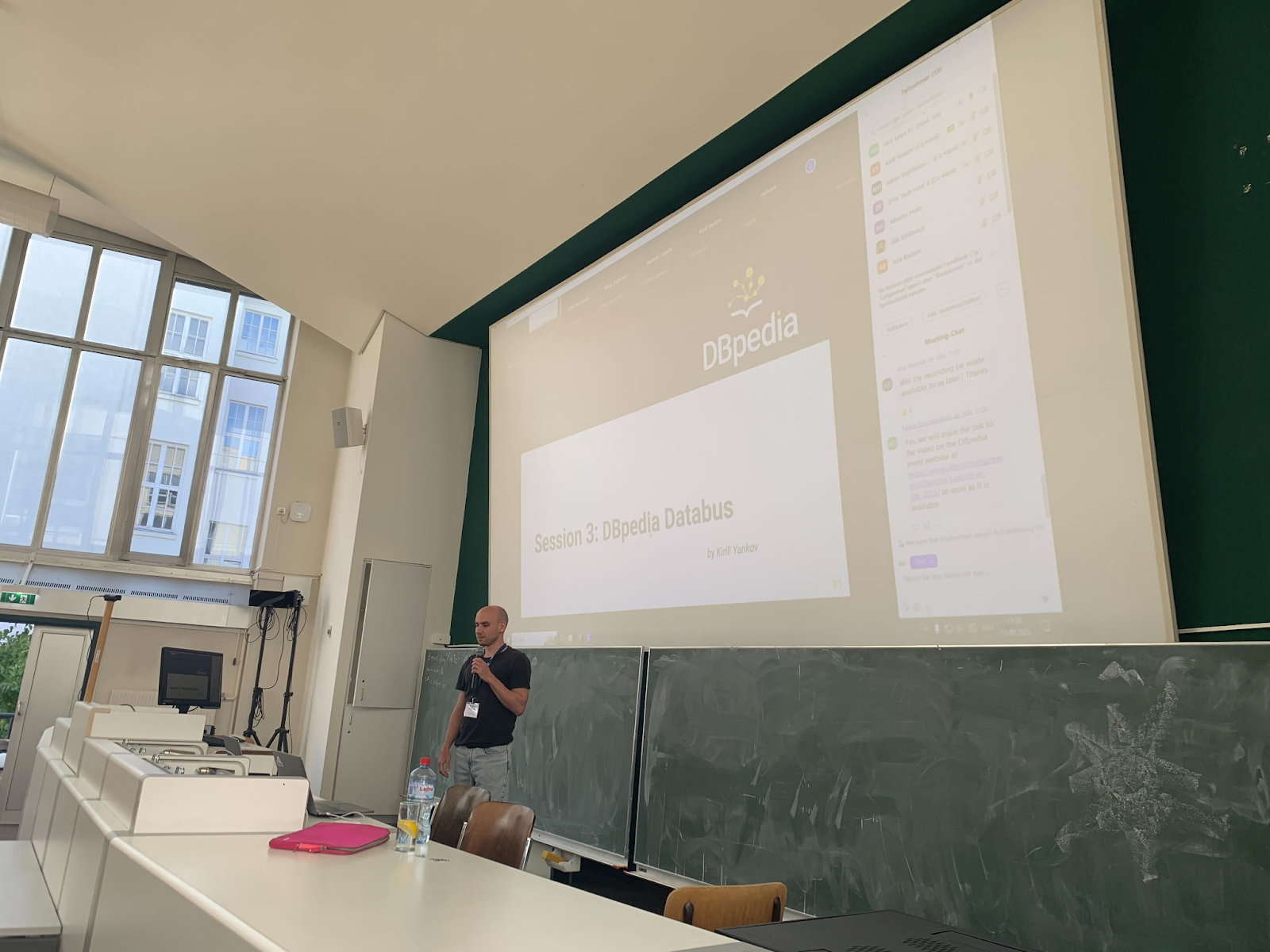
On 13th of September, 2023, an exciting tutorial took place at the University of Vienna in the Center for Translation Studies as part of the LDK 2023. The LDK conference focuses on the acquisition, maintenance and use of language data in the context of data science and knowledge-based applications. The tutorial was opened by Milan Dojchinovski (InfAI, DBpedia Association, CTU in Prague). This was followed by three sessions, which were accompanied by many real-world practical use cases, on the DBpedia Knowledge Graph, the infrastructure and the use of the databus data publishing platform. Check more details on our events page.
DBpedia Day @ SEMANTiCS in Leipzig
DBpedia Day was once again part of the program at this year’s SEMANTICS conference 2023. It was held on 20th of September at the HYPERION Hotel Leipzig with up to 100 DBpedians. Once again this year, our CEO Sebastian Hellmann opened the day with a presentation of the “DBpedia Databus version 2.1.0”. This was followed by the exciting keynote speech “Towards Foundation Models for Data Spaces” by Edward Curry from the University of Galway, Ireland. Afterwards, we organized the member session and the DBpedia Science Talk session. All slides can also be found on our events page.
Databus
Databus pre-launch announcement
We are in the final stage of the DBpedia Databus open software release (GitHub). Remaining issues include quality of life and UI improvements. Check out the Databus feature matrix for our lightweight, scalable, adaptable, powerful Data Catalog Platform (direct download link, persistent data identifier on the databus). Contact dbpedia@infai.org for demo, business, or research proposal inquiries.
Databus excels at cataloging de-central data of any filetype using RDF/DCAT. We selected a few initial focal use cases, where the Databus serves as:
- AIModelHub for AI training data, models, validation, and deployment.
- Research Data Management Catalog for research institutes and communities.
- Supply-Chain-Management Platform for product information collection along the supply chain and construction of Digital Product Passports.
- Community Data Portal, e.g., for the DBpedia Community.
DBpedia Contributions will be enabled soon, taking DBpedia to the moon! 🚀
In DBpedia’s future, the Databus will be used to collect community contributions more effectively, giving DBpedia an enormous boost in quantity and quality. https://databus.dbpedia.org already catalogs over 350k files with over 1 Million file downloads per month! We are preparing showcases, templates, and documentation for these community contribution types:
- Community Extensions such as caligraph.org or AI-improved abstracts.
- Community Link Contributions for inclusion in the main graph.
- RDF profiles for DBpedia Users and Members (FOAF, Schema.org, WebID) via Databus Accounts (including publication of expertise).
- Dockerized RDF Tool Deployment so you can automatically load DBpedia and other RDF data into your favorite RDF tools via Databus collections. Our Databus-powered Virtuoso SPARQL Endpoint Quickstart Docker has already been deployed over 150k times!
We do hope we will meet you and some new faces during our events next year. The association wants to get to know you because DBpedia is a community effort and would not continue to develop, improve and grow without you. We plan to have a tutorial at the LREC-COLING 2024 conference and a meeting at SEMANTiCS, Sep 17-19, 2024, conference in Amsterdam, Netherlands.
Stay safe and check Twitter, Instagram and LinkedIn or or subscribe to our Newsletter for the latest news and information.
Yours,
Julia & Maria
on behalf of the DBpedia Association
The post A year with DBpedia – Retrospective Part 2/2023 appeared first on DBpedia Association.
]]>The post Recap 2023: A Year with DBpedia appeared first on DBpedia Association.
]]>
Can you believe it..? … sixteen years ago the first DBpedia dataset was released. Sixteen years of development, improvements and growth. Now more than 4,100 GByte of data is hosted on the DBpedia Databus. We want to take this as an opportunity to send out a big “Thank you!” to all contributors, developers, members, hosters, funders, believers and DBpedia enthusiasts who made that possible. Thank you for your support!
In the upcoming blog series, we will take you on a retrospective tour through 2023. Furthermore, we will give you insights into a year with DBpedia. In the following we will also highlight our past events.
Snapshot Release
We are pleased to announce immediate availability of a new edition of the free and publicly accessible SPARQL Query Service Endpoint and Linked Data Pages, for interacting with the new Snapshot Dataset. In 2023, we released version 2022-12 release with all the features since version 2022-09. The current Snapshot Release contains more than 850 million facts (triples). Please check more details on our website.
Google Summer of Code (GSoC)
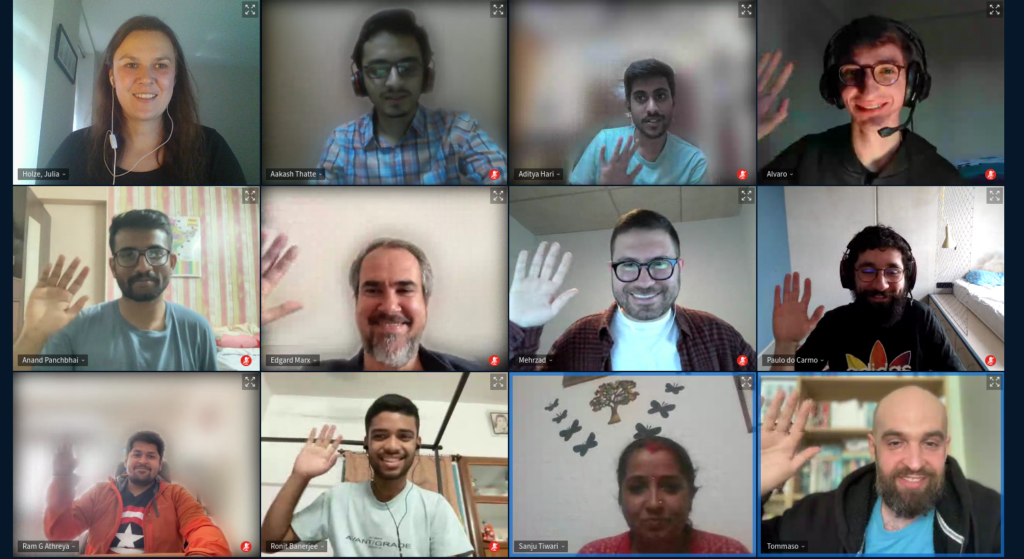
For the 12th year in a row, we have been able to support and guide young, ambitious developers who have joined us as an open source organization. We encouraged them to work on a programming project this summer. Each year we have been inspired by new project ideas, many amazing contributors, and mostly great project results that have shaped the future of DBpedia. If you want to have deeper insights in our GSoC contributors work you can find their blogs and repos on the DBpedia blog.
DBpedia @ Leipzig Semantic Web Day
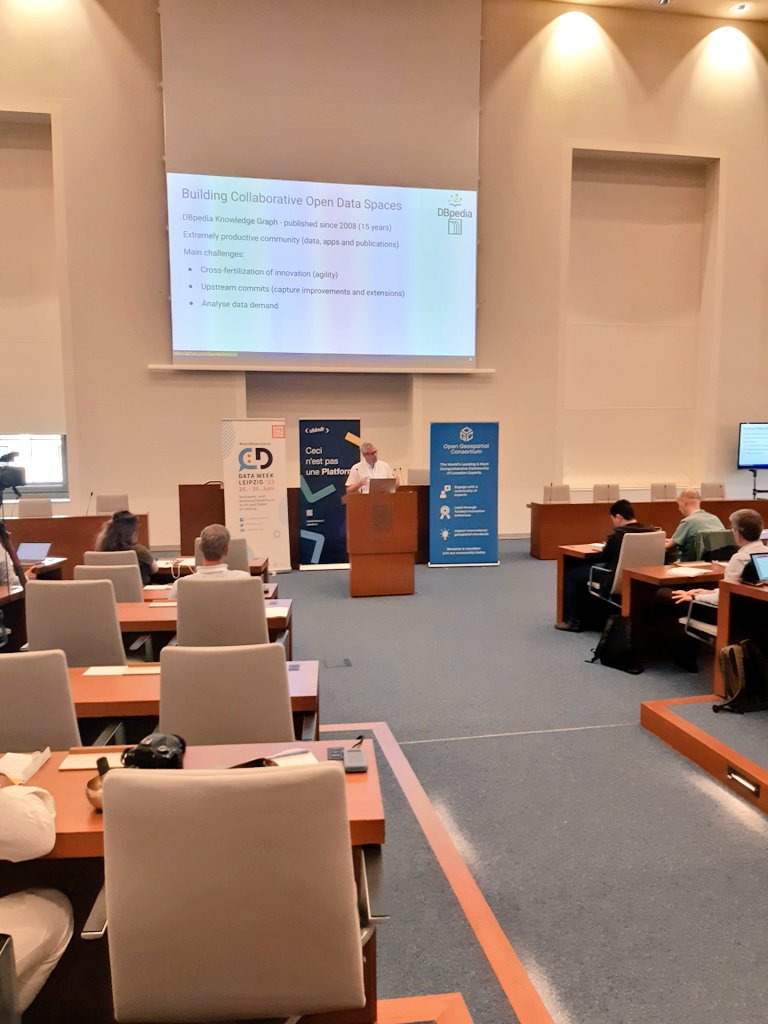
On June 28, 2023, Sebastian Hellmann presented the DBpedia Databus 2.1. at Data Week Leipzig. Data Week is the networking and exchange event for highlighting scientific, economic, and social perspectives of data and its use, where industry, citizens, science, and public authorities can enter into dialogue. Data Week Leipzig took place June 26-30, 2023. Please find Sebastian’s slides here.
In the upcoming blog post after the holidays we will give you more insights in the past events and technical achievements. We are now looking forward to the year 2024. The DBpedia team plans to have a tutorial at the LREC-COLING 2024 conference and the DBpedia Day at SEMANTiCS 2024 conference in Amsterdam, Netherlands.
Above all, we wish you a merry Christmas and a happy new year. In the meantime, stay tuned and check our Twitter, Instagram or LinkedIn channels. You can subscribe to our Newsletter for the latest news and information around DBpedia.
Julia & Maria,
on behalf of the DBpedia Association
The post Recap 2023: A Year with DBpedia appeared first on DBpedia Association.
]]>The post Retrospective: Google Summer of Code 2023 appeared first on DBpedia Association.
]]>
For the 12th year in a row, we have been able to support and guide young, ambitious developers who joined us as an open source organization to work on a programming project over this summer. This year we were once again inspired by new project ideas, great results and dedicated students. From the numerous and wonderful project applications we received, we were able to select six proposals to take part in the GSoC with their project idea. Every year, Google Summer of Code offers a great opportunity to work on projects remotely while getting a deep insight into open source projects like ours – DBpedia.
Meet our Google Summer of Code 2023 contributors and their projects
During our summer program, our six finalists worked intensely on their DBpedia projects and achieved great results to show to the public. Topics in the projects included machine learning and natural language processing, extraction frameworks and chatbot development. If you want to have deeper insights into our GSoC contributer’s work you can find their blogs and repos in the following list. Check them out!
- Towards a Neural Extraction Framework
- Multilingual Neural Data-to-Text Generation
- Knowledge Graph aware Recommendation System with DBpedia
- Question-Answering over DBpedia with Pretrained Auto-regressive Models
- DBpedia eXplainable Chatbot (DBpedia XChat)
- DBpedia Search API enhancement (SANTé)
Thanks to mentors
Thanks to all our mentors around the world for joining our project and supporting us with their expertise and kindness. Above all, a big thank you to those who have supported us for many years in a row. Thank you all again for spending over 3.5+ months working with this year’s GSoC contributors and helping them become better open source contributors!
Mentor Summit
After the last GSoC Mentor Summit took place online and was therefore open to all organisation admins and mentors, this year a mentor was again selected to attend the Mentor Summit 2023, which took place from Friday 13th to Sunday 15th October at the TETRA & Marriott Hotel Sunnyvale, California and was attended by @DiegoMoussallem.
After GSoC is before the next GSoC
We can not wait for the 2024 edition. Likewise, if you are an ambitious contributor who is interested in open source development and working with DBpedia you are more than welcome to either contribute your own project idea or apply for project ideas we offer starting in early 2024. If you would like to know where previous mentors and contributors are now working, please read our GSoC blog post about the last 10 years of DBpedia at GSoC.
In case you like to mentor a project do not hesitate to also get in touch with us via dbpedia@infai.org.
Stay safe and check Twitter or LinkedIn. Furthermore, you can subscribe to our Newsletter for the latest news and information around DBpedia.
Maria & Julia
on behalf of the DBpedia Association
The post Retrospective: Google Summer of Code 2023 appeared first on DBpedia Association.
]]>The post DBpedia Day in Leipzig @ SEMANTiCS 2023 appeared first on DBpedia Association.
]]>First and foremost, we would like to thank the Institute for Applied Informatics for supporting our community and many thanks to the SEMANTiCS organization team for hosting this year’s community meeting.
Opening of the DBpedia Day
Also this year, our CEO Sebastian Hellmann opened the community meeting by presenting the Databus 2.1.0 project (slides). Afterwards, Edward Curry from the University of Galway gave his fantastic keynote presentation “Towards Foundation Models for Data Spaces”. You can read his abstract here.
Member Presentation Session
Milan Dojchinovski, InfAI/DBpedia Association and CTU Prague, started the member presentation session with a short welcome. The first speaker was Angel Moreno, GNOSS, with his presentation “NEURALIA Rioja: the unified Knowledge Graph of La Rioja Government which integrates twenty six sources of information in a single access point” (slides). Shortly after, Enno Meijers, KB, talked about “Network-of-Terms, bringing links to your data” (slides). Next, Sarah Binta Alam Shoilee, Network Institute & Vrije Universiteit Amsterdam talked about ”Cultural AI Lab”(slides). This was followed by the presentation “Linking and Consumption of DBpedia in TriplyDB” by Kathrin Dentler & Wouter Beek, TriplyDB (slides). Then Sebastian Gabler, SWC, talked about “Using Dewey Decimal Classification for linked data” (slides). Finally, the last talk of this session was given by Sebastian Tramp, eccenca, with “Using DBpedia Services with eccenca Corporate Memory and eccenca.my”.
For further details of the presentations follow the links to the slides.
- “NEURALIA Rioja: the unified Knowledge Graph of La Rioja Government which integrates twenty six sources of information in a single access point” by Angel Moreno, GNOSS (slides)
- “Network-of-Terms, bringing links to your data” by Enno Meijers, KB (slides)
- ”Cultural AI Lab” by Sarah Binta Alam Shoilee, Network Institute & Vrije Universiteit Amsterdam (slides)
- “Linking and Consumption of DBpedia in TriplyDB” by Kathrin Dentler & Wouter Beek, TriplyDB (slides)
- “Using Dewey Decimal Classification for linked data” by Sebastian Gabler, SWC (slides)
- “Using DBpedia Services with eccenca Corporate Memory and eccenca.my” by Sebastian Tramp, eccenca (slides)
DBpedia Science: Linking and Consumption
This session was dedicated to the most recent research on linking and consumption of the DBpedia Knowledge Graph and beyond. Novel methods, tools and challenges around linking and consumption of knowledge graphs were presented and discussed. Milan Dojchinovski, InfAI/DBpedia Association and CTU Prague, chaired this session with five talks. Hereafter you will find the presentations given during this session:
- “Open Research Knowledge Graph” by Sören Auer, TIB
- “Blocking Methods for Entity Resolution on Knowledge Graphs” by Daniel Obraczka, Data Science Center ScaDS.AI Dresden/Leipzig (slides)
- “Validating SHACL Constraints with Reasoning: Lessons Learned from DBpedia” by Maribel Acosta, TUM School of Computation, Information and Technology
- “Exploiting Semi-Structured Information in Wikipedia for Knowledge Graph Construction” by Nicolas Heist, Data and Web Science Group, University of Mannheim (slides)
- “Using Pre-trained Language Models for Abstractive DBpedia Summarization” by Hamada Zahera, Data Science Group, Paderborn University (slides)
DBpedia Community session
Sebastian Hellmann, InfAI/DBpedia Association, hosted this year’s community session. DBpedia has had a major impact on data landscape during our 15-year journey. This session discussed the progress of the vision of a “Global and Unified Access to Knowledge Graphs”, which paved the way for an international FAIR Open Data Space driven by knowledge graphs. The session focused on the potential of large-scale knowledge graphs to reshape the open data domain. Topics included how the DBpedia community can pool its data, tools and know-how more effectively, and how we can make these assets more findable, accessible and interoperable. The session provided an insightful discourse on the future of open data and how we can forge strategic alliances across diverse industrial sectors.
Following, you find the presentations of this session:
- “Update Japanese DBpedia” Hideaki Takeda, LODI (slides)
- Several impulses about different topics and follow-up discussion, moderated by Sebastian Hellmann, InfAI/DBpedia Association (discussion document)
In case you missed the event, all slides are also available on our event page. Further insights, feedback and photos about the event are available on Twitter via #DBpediaDay.
We are now looking forward to more DBpedia events in the upcoming months and at next year’s SEMANTiCS Conference, which will be held in Amsterdam, Netherlands.
Stay safe and check Twitter or LinkedIn. Furthermore, you can subscribe to our Newsletter for the latest news and information around DBpedia.
Maria & Julia
on behalf of the DBpedia Association
The post DBpedia Day in Leipzig @ SEMANTiCS 2023 appeared first on DBpedia Association.
]]>The post Retrospective 2023 – Half a year with DBpedia appeared first on DBpedia Association.
]]>DBpedia is part of the Google Summer of Code project 2023
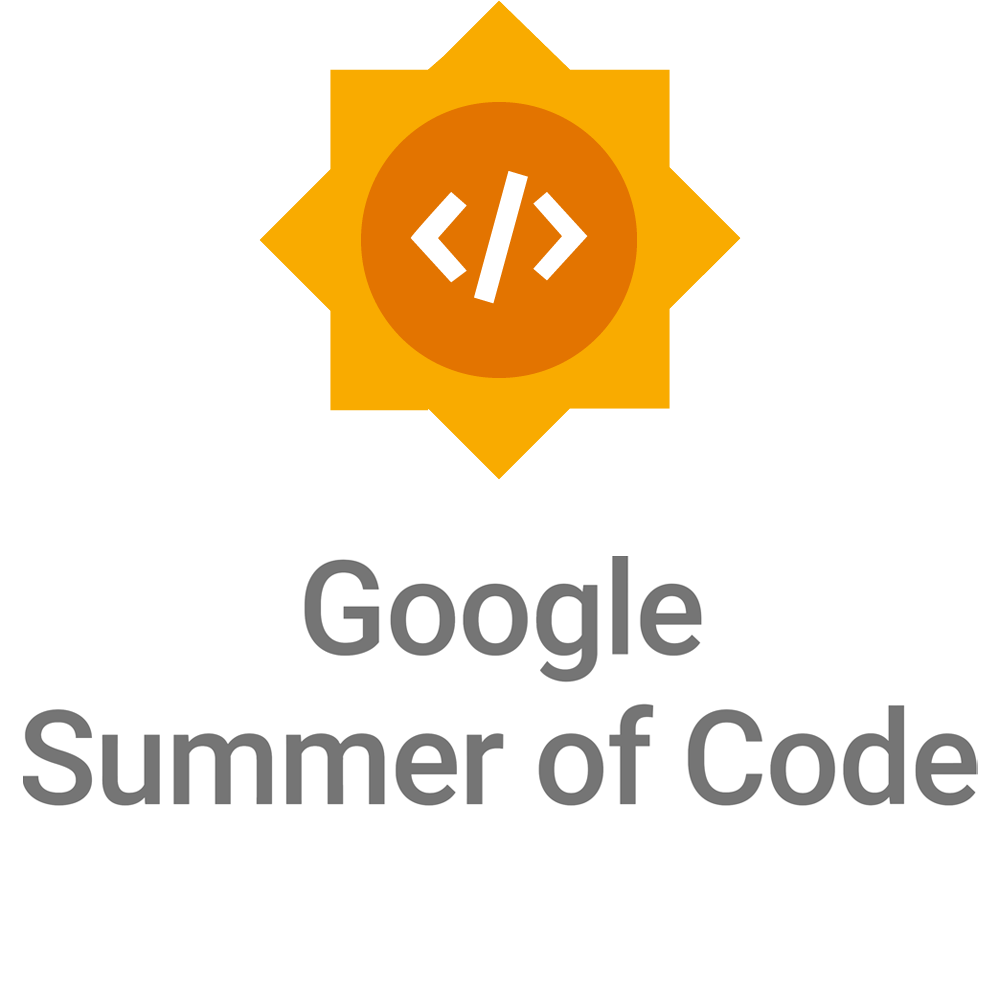
So far, each year has brought us new project ideas, many amazing students and great project results that shaped the future of DBpedia. Like every year, we received many fantastic applications this year. Out of these applications 6 great projects from contributors all over the world were selected to work together with our mentors. Right now the contributors are in the middle of the coding phase. If you want to know more about this year’s projects go and have a look at the DBpedia blog.
DBpedia Snapshot 2022-12 Release
We are pleased to announce immediate availability of a new edition of the free and publicly accessible Sparql Query Service Endpoint and Linked Data pages, for interacting with the new Snapshot Dataset. Check our blog!
Leipzig Semantic Web Day
On June 28, 2023, Sebastian Hellmann presented the DBpedia Databus 2.1. at Data Week Leipzig. Data Week is the networking and exchange event for highlighting scientific, economic, and social perspectives of data and its use, where industry, citizens, science, and public authorities can enter into dialogue. Data Week Leipzig took place June 26-30, 2023. Please find Sebastian’s slides here.
What Will the Future Bring?
We are now looking forward to the LDK conference, which will take place September 12-15, 2023, in Vienna, Austria. Will will organize a tutorial on September 13, 2023. If you would like to join, please check more details on our event page. After that, we’ll fly straight back to Leipzig, because the Semantics Conference will be held at the Hyperion Hotel Leipzig from September 20 to 22, 2023. At the beginning of the conference, we will host the DBpedia Day on September 20, 2023.
Stay safe and check Twitter or LinkedIn. Furthermore, you can subscribe to our newsletter for the latest news and information around DBpedia.
Julia
on behalf of the DBpedia Association
The post Retrospective 2023 – Half a year with DBpedia appeared first on DBpedia Association.
]]>